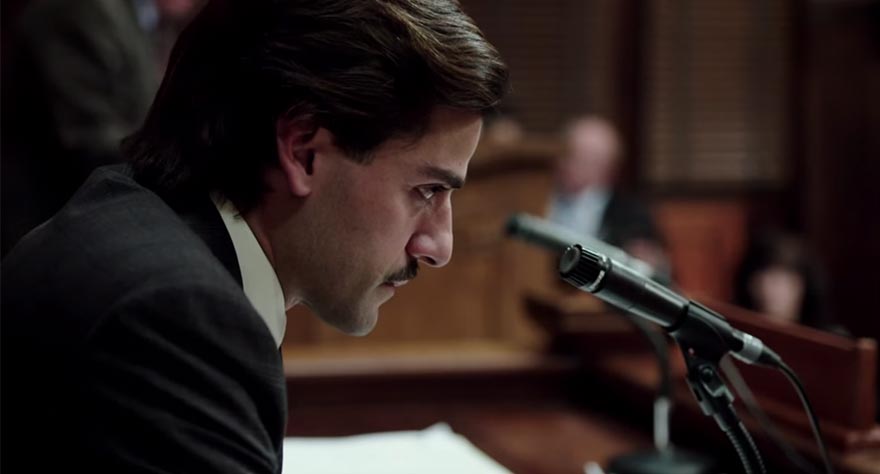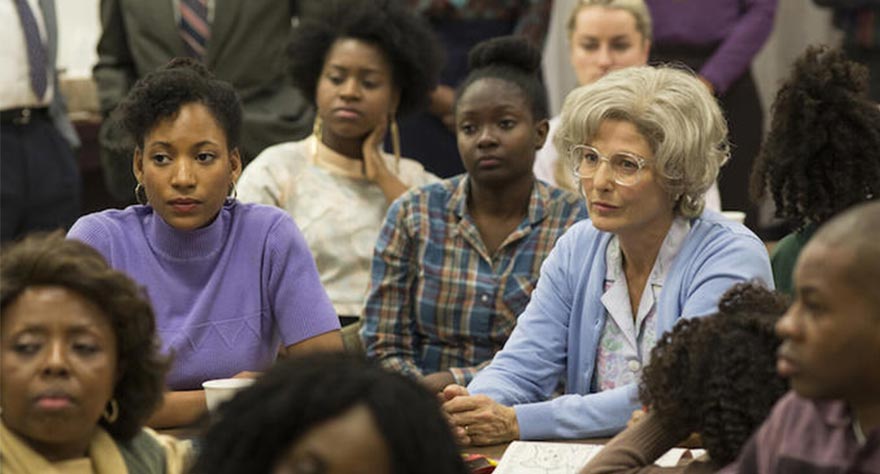Show Me A Hero: Part 5 and 6

Need a refresher? If so, be sure to read our reviews for Part 1 & 2, and Part 3 & 4 first.
“Are you happy with the house? I’d like to think it was worth it.”
The words of F. Scott Fitzgerald hang over the final two chapters of David Simon’s and William F. Zorzi’s Show Me A Hero like the Sword of Damocles. Except, in this case, fear hangs over everyone equally, not just those in positions of power. Part 5 and 6 spans events from early ’91 to late ’93, and with this being the final two chapters, the narrative has naturally shifted away from the confines of the judge’s chambers and noisy council meetings, in order to focus on the tenants we familiarized ourselves with from the West side of the Parkway. Hank Spallone (Alfred Molina) is mostly mentioned by name, and seen a brief two times in the whole two hours, before the new mayor Terry Zaleski (Daniel Sauli) takes office. Not much time is spent with Zaleski, but enough to know that he’s the shiftiest Democrat presented in the entire miniseries, and the biggest nemesis to our hero, Nick (Oscar Isaac). Judge Sands (Bob Balaban) and Michael Sussman (Jon Berenthal), so instrumental in getting the housing bill passed, don’t make a single appearance, while Oscar Newman’s (Peter Riegart) greatest contribution is to hand over the housing counselling to the most important new character, Robert Mayhawk (The Wire alumnus, Clarke Peters).
Parts 5 and 6 distance themselves by some margin from the politics that dominated proceedings in the previous parts, and is mostly split between two narrative strings. The first follows Nick, desperately seeking recognition and a way back into office. The more he fails, the deeper he sinks into an egotistical vortex of self-loathing, even costing Nay’s (Carla Quevedo) job by playing political games with her bosses (only to eventually realize that the only one being played is him). At the beginning of Part 5, his friendship and alliance with Jim Surdoval (Michael Stahl-David) is severed because Jim is backing Zaleski for mayor. Vini Restiano (Winona Ryder), the friend Nick comforted in Part 2 when she got shut out of politics, makes a powerful comeback in Parts 5 and 6, only to find herself in direct opposition with Nick when he decides to run against her as City Council President. When she asks him, with tearful resentment, if he really believes in anything but himself, the gist of the message is clear; the ugly, cruel game of politics is frightfully masochistic in nature. As I mentioned in last week’s recap, the strong sense of the corrupt nature of politics being the primal theme of the show rings deafeningly true all the way to the soul-crushing conclusion. For those who have resisted the urge to Wikipedia the real Nick Wasicsko, I will refrain from spoiling, but, with Fitzgerald’s words in mind, you can probably guess what happens.

The second narrative thread is the only one with some hopefulness, though not before it gets tangled up in fear. Billie (Dominique Fishback)—who gets little sympathy from me and whose storyline remains the most ubiquitously irritating thanks to her godawful choice in partner—, Norma (LaTanya Richardson Jackson), who is still reluctant to mingle with white people, and Doreen (Natalie Paul), who has come a long way from her junkie days, all move to the new low-income townhouses. Doreen gets involved with the new local community and through that befriends Mary (Catherine Keener). That’s right, what we expected all along finally materializes at the beginning of Part 6: Mary officially switches sides when she starts to focus on those trying to do right by their neighborhoods and be upstanding citizens. Meanwhile, Carmen (Ilfenesh Hadera) remains stuck in the projects because her name is put on the waiting list for the next houses, but her story’s conclusion is appropriately cathartic all the same. Mayhawk councils a team of volunteers (Mary included) on how to approach and help the new neighbours assimilate themselves into their new surroundings, coyly saying at one point that they’ll be learning more about themselves than the new families. As expected, the predominantly white community doesn’t take kindly to the new residents at first, instilling distrust, fear, and prejudice; all the more reason why the final image is a ray of sunshine.
The tone of the show’s final hours is very much a somber one. As with the episodes that preceded, Simon, Zorzi and Paul Haggis show off their artistic range with equal touches of subtle deftness and emotional hemorrhaging. Recall—and try to do so without getting goosebumps—the final montage of Bruce Springsteen’s eternally tender “Lift Me Up.” The fate of every character reminding us that these are real people’s stories. Then consider the opening of Part 6, mid-sentence in Mayor Zaleski’s speech, “-which for Yonkers has been a long time coming.” We know what he’s talking about, and thanks to this brilliantly understated opening, we also know he doesn’t care.
No, the only one who truly cares is Nick, and there are two profound scenes in these two hours where we see what all that care gets him. The first is when he visits the lottery spin to see which lucky tenants get to live in the new houses. He sits in the back, genuinely happy for the people, but slowly realizes that no one knows who he is and that he’s got no business being there other than to satisfy his own sense of pride. The second is when he literally goes door to door of the new houses to speak with tenants directly, to see how they’re feeling, perhaps get a modicum of gratitude. He gets the door slammed in his face until one person does recognize him. Blind Norma. It’s powerful stuff and the beating heart of Show Me A Hero. A man who jeopardized his political career to get the housing bill passed, but made the mistake of expecting a handshake instead of being satisfied with the work itself.
Show Me A Hero stands next to Simon’s previous sensational miniseries, The Corner (2000) and Generation Kill (2008), and under the auspices of his crowning achievement with Zorzi, The Wire, as essential television that drills into the truth of people. People with flaws and strengths on display, equally weighed. What happens to a good man when he gets a taste of that sweet poison of power? How does one navigate the moment in a person’s career when real change becomes a probable reality? These are the heavyweight questions we’ve come to expect of creator David Simon. The kind that keeps the Sword hanging above all our heads, and that will surely keep me revisiting Show Me A Hero again and again.
9.5/10
